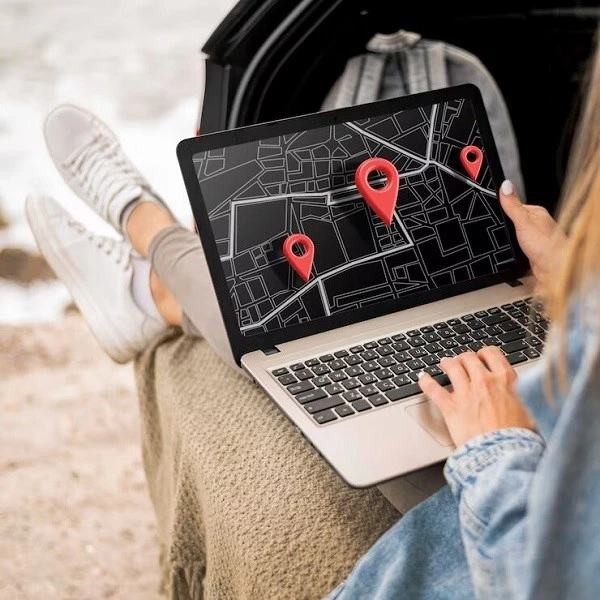Cutting edge GPS tracker technology is driving a remarkable transformation in the transport sector as we stand on the cusp of the future. This evolution is improving efficiency, safety, and sustainability in all areas while also revolutionizing fleet management. Real-time vehicle tracking and monitoring is essential in today's hectic world. Businesses can now manage their fleets more effectively than ever before thanks to GPS trackers, which guarantee better fuel efficiency, proactive maintenance, and the best routes. This degree of insight is bringing about a new era of smarter, more efficient logistics and changing the transportation landscape. Moreover, GPS are essential in lowering carbon footprints as environmental awareness gains prominence. These technologies are helping to create a more sustainable and environmentally friendly fleet operator base by allowing them to optimize routes and reduce idle time. Trackers have a huge impact on transportation, and as we look to the future, it's obvious that these developments will completely change the sector in ways that we can't even begin to fathom.
The Evolution of GPS Technology
Better NavigationPrecision and Accuracy: Vehicles can navigate with previously unheard-of precision thanks to GPS technology, which provides extremely accurate positioning data. This has drastically decreased the possibility of getting lost or choosing ineffective routes.Real-time Updates: Modern GPS devices provide up-to-date information on alternate routes, traffic patterns, and road closures in real time. Time is saved, and it also helps to lessen traffic jams and improve traffic flow.The Revolution in Fleet Management:Optimized Routes: Businesses can use GPS trackers to create optimized routes that save on fuel and travel time. This is especially important for fleet management, as even minor routing changes can save a lot of money and have a positive impact on the environment.Proactive Maintenance: GPS tracking devices enable proactive maintenance by providing real-time vehicle health and performance monitoring. This lowers maintenance expenses and downtime by preventing malfunctions.Enhanced SecurityEmergency Response: GPS technology facilitates quick and accurate emergency response in case of an emergency. Emergency personnel have the ability to swiftly locate and arrive at the scene, possibly saving lives.Trackers have the ability to monitor driver behavior, which encourages safer driving practices. This covers monitoring speed, applying forceful braking or acceleration, and following traffic laws.Effect on the Environment:Decreased Carbon Footprint: GPS trackers are essential for lowering the carbon footprint of transportation as environmental issues gain prominence. By reducing fuel use and emissions, optimal routing helps to create a more environmentally friendly and sustainable transportation industry.Connectivity with Data Analytics and IoT:Data-driven Insights: Gathering enormous volumes of data is made possible by integration with the Internet of Things (IoT). By analyzing this data, important insights into fuel consumption trends, transportation patterns, and other KPIs can be obtained.Predictive analytics: Predictive maintenance, route planning, and other proactive actions that improve overall operational efficiency are made possible by combining GPS data with advanced analytics.Prospective Opportunities:Autonomous Vehicles: The development of autonomous vehicles is based on GPS technology. The development of GPS systems will be essential to the eventual realization of self-driving cars and trucks.Integration with Smart Cities: GPS technology is expected to be integrated with urban infrastructure as cities grow smarter in order to improve traffic flow, lessen congestion, and increase the effectiveness of transportation as a whole.Advantages of Using GPS in Transportation
Accurate Navigation:Accurate Positioning: GPS enables precise navigation by providing extremely accurate real-time positioning data. For drivers and fleet managers to arrive at their destinations quickly and efficiently, this is essential.Enhanced Effectiveness:
Routes that are optimized with the aid of GPS technology result in shorter travel times and less fuel consumption. Businesses benefit from increased productivity as well as cost savings, especially when it comes to fleet management.Increased Security:
Emergency Response: GPS allows for fast and precise location identification in the event of an accident or emergency, which speeds up emergency response times.
GPS trackers have the ability to monitor driver behavior, which can encourage safer driving practices and lower the likelihood of collisions.Fleet Administration:
Real-time tracking: Companies are able to monitor their fleets more effectively by tracking their cars in real time. This entails keeping an eye on the position, speed, and other crucial factors of the vehicle.
Proactive Maintenance: By giving real-time information about a vehicle's condition, GPS tracking devices makes proactive maintenance possible. This lowers maintenance costs and helps avoid malfunctions.Cost Reductions:
Fuel Efficiency: Transportation companies can save money by using more fuel efficiently, which is achieved through optimized routes and decreased idle time.
Decreased Downtime: Preventive maintenance and prompt attention to possible problems help reduce vehicle downtime, guaranteeing that cars continue to operate and be driven.Effect on the Environment:
Decreased Emissions: GPS technology helps to maintain environmental sustainability by cutting fuel costs and optimizing routes, which lowers the transportation industry's overall carbon footprint.Customer Contentment:
Precise ETAs: GPS allows companies to give precise estimated arrival times (ETAs) to their clients. By eliminating doubt and delays, this raises customer satisfaction.Decision-making based on data:
Analytics and insights: By analyzing GPS data, one can learn important things about vehicle performance, transportation trends, and other important metrics. Making educated decisions and developing strategic plans is made possible by this data-driven methodology.Accountability and Conformity:
Regulatory Compliance: GPS tracking devices assist in guaranteeing adherence to rules, such as those governing the hours of service for commercial drivers.
Accountability: GPS data gives drivers and staff members a thorough record of the movements of their vehicles, encouraging accountability.Combining One Technology with Another:
Internet of Things (IoT): By enabling data sharing between infrastructure and vehicles, GPS integration with IoT creates a more intelligent and connected transportation system.
Telematics: GPS and telematics together enable thorough vehicle performance monitoring, which includes fuel economy and engine diagnostics.
Conclusion:
A revolutionary change is brought about in the transportation sector by the use of GPS tracker technology, which offers advantages like precise navigation, more productivity, higher security, lower costs, environmental sustainability, better customer satisfaction, informed decision-making, and regulatory compliance. The transportation industry will benefit even more from the integration of GPS tracking devices for vehicles and related technologies as long as technology continues to progress.


